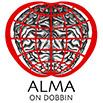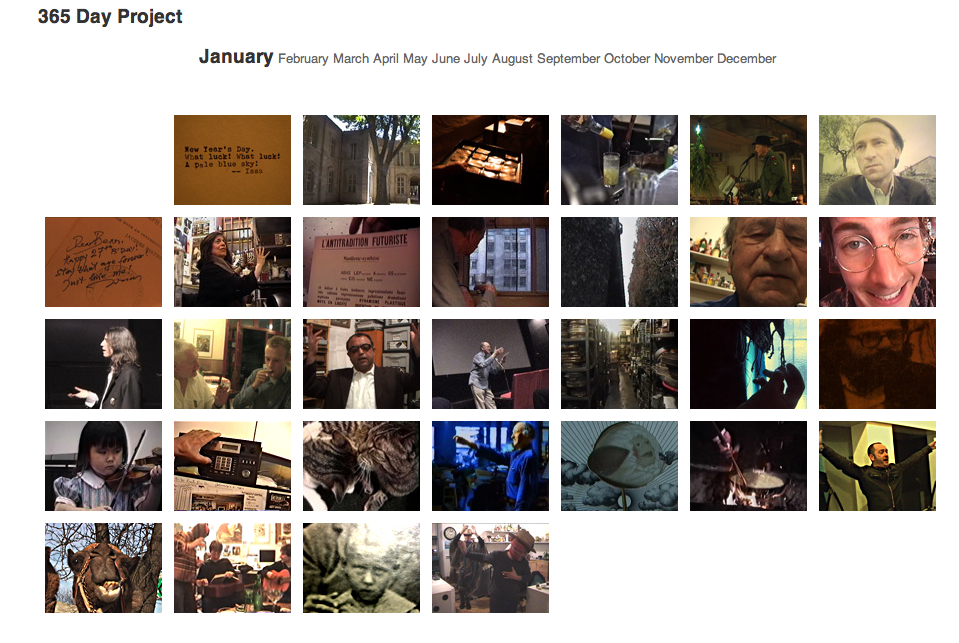
365 Day Project
2B Galéria, Budapest
Jonas Mekas
June 8, 2012 throughJuly 6, 2012
Jonas Mekas was hailed as the Godfather of American Avant-Garde Cinema during his MoMA PS1 feature exhibition.
For this presentation of 365 Day Project at 2B Galéria, twelve screens are installed in a linear fashion to parallel the nature of the film material. Each monitor on the wall corresponds to a moment in Mekas’s life; together the screens construct a chronicle of the artist’s life. The spectator’s gaze reconstructs the logic of the artist’s memory, the logic of time (chronology), and the history of Jonas Mekas. The gallery installation is completed with the projection of Sleepless Nights Stories (2011) and First 40 (2006) in the gallery’s dark room.
365 Day Project is available on the artist’s website, http://jonasmekasfilms.com
See also:
“A few things I want to share with you, my Paris friends.”
Galerie du Jour agnès b., May 16 - June 20, 2009. Curator: Benn Northover.
“Jonas Mekas: The Beauty of Friends Being Together Quartet.”
P.S.1 Contemporary Art Center, February 11 - April 16, 2007. Curator: Phong Bui.
-
During Jonas Mekas’s 2007 exhibition at MoMA’s PS1, he was hailed as The Godfather of American Avant-Garde Cinema, and celebrated as the founder of the Anthology Film Archives, The Film–Makers' Cooperative, and Film Culture magazine. Mekas started the "Movie Journal" column for the Village Voice in 1958 and remained a film critic at the publication until 1978.
Jonas Mekas was born in 1922, in the farming village of Semeniškiai, Lithuania. He currently lives and works in New York City. In 1944, the Nazis took him and his brother, Adolfas, to a forced labor camp in Elmshorn, Germany. After World War II, he studied philosophy at the University of Mainz. At the end of 1949, the UN Refugee Organization brought both brothers to New York City, where they settled in Williamsburg, Brooklyn.
Two weeks after his arrival in New York City, Jonas Mekas borrowed money to buy his first Rolex camera, and began to record moments of his life. He became deeply involved in the American avant-garde film movementIn 1962 he founded the Film-Makers’ Cooperative, and in 1964 the Film-Makers’ Cinematheque, which eventually grew into Anthology Film Archives, one of the world’s primary repositories of avant-garde cinema, and a screening venue.
During all this time Jonas Mekas continued writing poetry and making films. To date he has published more than twenty books of prose and poetry, which have been translated into numerous languages. His Lithuanian poetry is now part of Lithuanian classic literature, and his films can be found in leading museums around the world. He is largely credited with developing the Diarist Cinema—“an intimate first-person collision of poetry, fiction, documentary, and formal experimentation through which any autobiographical themes can be explored.” Mekas has also been active as an academic, teaching at the New School for Social Research, the International Center for Photography (ICP), Cooper Union, New York University, and MIT.
Mekas’ film The Brig was awarded the Grand Prize at the Venice Film Festival in 1963. Other films include Walden (1969), Reminiscences of a Journey to Lithuania (1972), Lost Lost Lost (1975), Scenes from the Life of Andy Warhol (1990), Scenes from the Life of George Maciunas (1992), and As I was Moving Ahead I Saw Brief Glimpses of Beauty (2000).
© ALMA 2014
